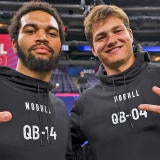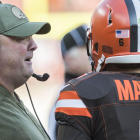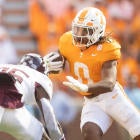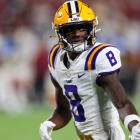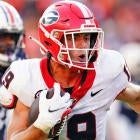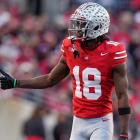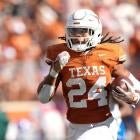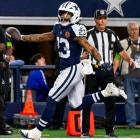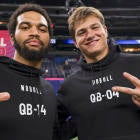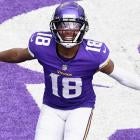One of the brightest young players in the NFL is Baker Mayfield. One of the best young rushers in the NFL is Nick Chubb. One of the best receivers in the NFL is Odell Beckham.
When it comes to satisfying expectations, Browns head coach and playcaller Freddie Kitchens has a lot on his plate.
Kitchens will call the shots with input from ex-Buccaneers offensive coordinator Todd Monken. Kitchens has called plays for exactly eight NFL games — he won five of the eight, and as you'll learn, he trusted his quarterback quite a bit. Monken has called plays for exactly 15 NFL games, and he, too, trusted his quarterback a bunch.
It makes for a very good situation for Mayfield, albeit one without much data to back it up.
We crunched the numbers on Kitchens' play calls for the last half of the 2018 season to give us a glimpse into how the Browns might operate beginning in 2019. Here's what we have.
Pass-run ratio
Overall, the Browns came in at 59 percent passes compared to 41 percent runs under Kitchens. What's notable is in the Browns' five wins with Kitchens calling plays, they were almost exactly balanced at 50-50. In their three losses they were absurdly off-kilter — 73 percent pass, 27 percent run. It's not surprising to see a coach go pass-heavy when playing from behind, but a 73 percent pass ratio is bonkers.
The difference this year is in the Browns' upgraded talent. Lining Mayfield up with Beckham and a very good group of complementary receivers will make them very tough to stop. It also makes them even more unlikely to be balanced with the run and the pass, even in their victories.
There's considerable Fantasy hype around Mayfield and it's completely warranted. He's got an incredible skill set, a stud receiver to target heavily and a bunch of unique pass catchers to play off of. The offensive line isn't bad either. I see Mayfield as a top-6 Fantasy quarterback worth targeting as soon as the first four quarterbacks go off the board on Draft Day.
RB runs called per game
If you're targeting Nick Chubb in 2019 drafts, you'd probably wish for that number to be a little higher. And when the Browns won under Kitchens, that number was higher — 22.6 carries per game. Not surprisingly, in their three losses the Browns' running backs averaged 15.0 carries per game.
Maybe if this were the "old" Browns, these numbers would sway us away from their rushers. But Cleveland seems to be a team on the rise, complete with an outstanding young rusher in Chubb. Of course we'd wish for more touches — perhaps we'll get them when the Browns string together more wins than losses in 2019. He'll be a top-12 running back who will get taken between the middle of Round 2 and the start of Round 3.
It wouldn't hurt if the Browns used Chubb more in the passing game, either.
Not that Kitchens didn't try.
Reception Distribution
Honestly, it's all good news here. Whereas Chubb didn't get a slew of touches week in or week out and did split receptions, it's a clear tendency for Kitchens to lean on his running backs. Nearly a third of the receptions went their way!
Chubb's season kicked into high gear when the Browns traded Carlos Hyde, but his receiving opportunities didn't really start until Kitchens took over. In eight games, Chubb caught 18 passes including six in the three losses. Unfortunately for Chubb, Duke Johnson still had a larger share in the pass attack, rounding up 27 grabs over eight games and 12 in those three defeats. This tough-luck target split will continue even if Johnson (eventually) departs the Browns, since Kareem Hunt is a very good receiving back in his own right.
We might not see a scenario where Chubb regularly out-catches Johnson or Hunt, but we should also never see Johnson or Hunt out-carry Chubb. Chubb out-touched Johnson 19.8 to 5.6 in games Kitchens called plays in. Hunt's giving Chubb an eight-game head start on cementing his role in the run game and is promised nothing in terms of playing time upon his November return. I'd only draft Hunt if I could get him seriously late, and only if I previously drafted Chubb.
While we'll line up to draft Chubb, we might have to take a step back from David Njoku. The athletic-but-raw tight end had the same amount of touchdowns with both Kitchens and Todd Haley but saw more targets with Haley (6.4) than Kitchens (4.6). However, Njoku did improve his receiving average from 9.6 to 13.7 with Kitchens. That part is nice, but it's not enough to expect Njoku to fulfill his potential as a stud Fantasy tight end. Adding Beckham to the mix will not help. It'll probably take a strong training camp and preseason to buy into him as a big-time player, even at a thin position.
Kitchens' playcalling versatility — and Mayfield's ability to function in it — left a less-than-desirable amount for the Browns' receivers. He preferred to spread the ball around, not to lean too heavily on one or two receivers. That decision crippled the production for Jarvis Landry (nearly a 5.0 target per game dip from Haley to Kitchens) and further limited Antonio Callaway (1.3 target decline).
It remains to be seen if Kitchens will keep up the spread-the-ball-around approach with Beckham, but if he does it he's wasting one of the best talents in the NFL. Why trade so much for a receiver you'll only target seven times a game?! Beckham has feasted on a diet of over 10 targets per game over his career, and it shouldn't stop here.
That's why Beckham is sturdy as a top-15 pick and Landry is more like a borderline No. 2/No. 3 receiver. Callaway has sleeper potential in Best Ball formats and could be a good bye-week boom-or-bust candidate.







